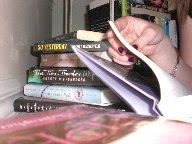 Take careful note that this is my first draft but I thought I should post another writing folio piece seeing as I’ve started back at uni now. Hoorah!
Take careful note that this is my first draft but I thought I should post another writing folio piece seeing as I’ve started back at uni now. Hoorah!Enjoy and please criticize as much as you like!
I remember when he came for me at night. I used to wait for him, watching and holding my breath, hoping that perhaps one day, he would stop coming. When he did come, the darkness in my room settles to the earth and he almost glides to my side and whispers the events that happened that day, that year and my whole life. When he departs I used to dive under the darkness that was slowly rising to try and get a glimpse of his feet. The mystery frustrated and frightened me. He told me everything about him, but never anything about his feet. I hated not knowing the full situation, yet I hated remembering. It always made me wonder whether he was really telling me everything, or whether he was leaving something out, like his feet or some very small but significant piece of information I should know about.
My thoughts would fill as the darkness rose when he left and I would wonder every night whether I should ask questions, give my opinion or even demand to see. I never did. I sat, I listened and then waited through the rest of the day until night falls, darkness sinks to the ground and I remember.
When he came for me this evening to help me remember, he was not alone. I dived under the darkness hoping he would not see me, that perhaps on this changing evening, the man that comes for me every night would forget I existed and the man next to him would leave me be. The man standing next to him had a suitcase in his hand and brown leather shoes. When I saw the shoes as I lay on the cold earth I wondered whether this was the night I would be shown something new and not just reminded about the old. The man that comes for me every night glided as usual towards me and whispered the usual information I’m supposed to know about. I sat up cautiously, waiting for something new to be said. But I didn’t hear anything new and after he finished he glided out, the darkness rose and the man in brown shoes disappeared. After the third evening of this occurring, the man with the shoes shook hands with the other man and they walked out. On the fourth evening, I was taken…
Jinx xx


